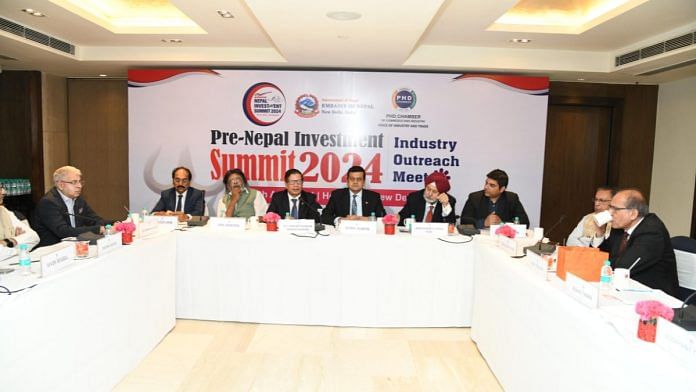New Delhi: Nepal is trying to create a safe space for investment and investors, particularly Indian, to counter its rocky tryst with democracy which has seen many coalitions made and remade since 2008.
Nepal’s ambassador Shankar Prasad Sharma told ThePrint that the government has been drawing up agreements, contracts and fresh laws to protect financiers.
Sharma said a bilateral investment agreement model has also been published by Nepal very recently. “They will help in protecting and securing their investment in Nepal. This is one of the areas we are looking at. To give policy stability, these are very important instruments and components for investors,” he said.
Sharma spoke to ThePrint on the sidelines of an industry outreach meeting hosted by the embassy of Nepal along with the Nepal Investment Summit and India’s PHD Chamber of Commerce and Industry Thursday.
During the meeting, Sharma highlighted that the tripartite agreement between India, Bangladesh and Nepal for the export of power from Kathmandu to Dhaka only required the “final signature”. He also said a bilateral investment agreement between Kathmandu and New Delhi “should be signed very soon”.
The outreach is a part of the government’s attempt to highlight the Himalayan country’s economic value to Indian investors. Sharma said that for Nepal, India was its largest investor, accounting for nearly a third of all foreign investment in the country.
“If we see historically, about one-third of our total investment is from India. That’s for several reasons – one is geographical proximity and the second is because our import and export is very high with India. Two-thirds of our total trade is with India,” Sharma told ThePrint.
The programme comes a month after Nepal’s prime minister Pushpa Kamal Dahal (Prachanda) broke a year-long coalition agreement with the Nepali Congress and formed a new one with former prime minister K.P. Oli’s party, the Communist Party of Nepal (Unified Marxist-Leninist).
Since Prachanda came to power at the end of 2022, his party has reforged coalitions with the CPN-UML and the NC, before returning to an alliance with the CPN-UML recently.
The new coalition has reported to be closing on formalising its Belt and Road Initiative implementation plan with China.
Also read: India, Nepal deepen ties with high-level talks
Nepal open for business
Sushil Bhatta, the chief executive officer of the Investment Bank of Nepal, said Nepal was open for business and highlighted sectors such as agro-processing, tourism, green energy and information technology as potential areas of Indian private investment.
“In the energy space, I am sure India requires clean and green energy. We have excellent bilateral exchange on the energy front… Where there is a market, the projects are viable. Investment also comes from where the market is,” Bhatta told ThePrint.
Bhatta said even with a government change, there was no shift in its policy priorities – an assurance that echoed the ambassador’s.
“We have always been getting a good amount of interest from India. The (Nepal) government has also been very pragmatically coming forward to host this event — a decision of the previous government,” Bhatta said.
He added this event was launched by the last government, and even if the government changes going forward, there will be continuity in “our priorities, our decisions and our agreements”.
(Edited by Tikli Basu)
Also read: Why BRI isn’t taking off in Nepal—China’s mixed signals, PM Dahal’s second thoughts



